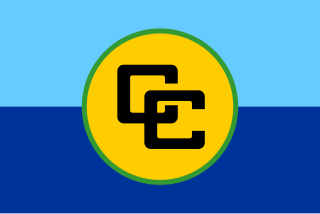
Latin America, , is a cultural concept denoting the region consisting of all the countries of the Americas south of the United States where Romance languages—languages derived from Latin —are predominant. The term was coined in France in the mid-19th century to refer to regions in the Americas that were ruled by the Spanish, Portuguese, and French empires. The term does not have a precise definition, but it is "commonly used to describe South America, Central America, Mexico, and the islands of the Caribbean." In a narrow sense, it refers to Spanish America and Brazil. The term "Latin America" is broader than Hispanic America, which specifically refers to Spanish-speaking countries; and lesser than categories such as Ibero-America, a term that refers to both Spanish and Portuguese-speaking countries from Europe and Americas.

The North American Free Trade Agreement was an agreement signed by Canada, Mexico, and the United States that created a trilateral trade bloc in North America. The agreement came into force on January 1, 1994, and superseded the 1988 Canada–United States Free Trade Agreement between the United States and Canada. The NAFTA trade bloc formed one of the largest trade blocs in the world by gross domestic product.

The Organization of American States is an international organization founded on 30 April 1948 to promote cooperation among its member states within the Americas.

The Free Trade Area of the Americas (FTAA) was a proposed agreement to eliminate or reduce the trade barriers among all countries in the Americas, excluding Cuba. Negotiations to establish the FTAA ended in failure, however, with all parties unable to reach an agreement by the 2005 deadline they had set for themselves.

The Caribbean Community is an intergovernmental organisation that is a political and economic union of 15 member states throughout the Americas and Atlantic Ocean. They have primary objectives to promote economic integration and cooperation among its members, ensure that the benefits of integration are equitably shared, and coordinate foreign policy. The organisation was established in 1973, with its four founding members signing the Treaty of Chaguaramas. Its primary activities involve:

The International Republican Institute (IRI) is an American nonprofit organization founded in 1983 and funded and supported by the United States federal government. Most of its board is drawn from the Republican Party. It is committed to advancing freedom and democracy worldwide by helping political parties to become more issue-based and responsive, assisting citizens to participate in government planning, and working to increase the role of marginalized groups in the political process, including women and youth. It was initially known as the National Republican Institute for International Affairs.
The Front for the Advancement and Progress of Haiti (FRAPH) (French: Front pour l'Avancement et le Progrès Haitien) was a far-right paramilitary group organized in mid-1993. Its goal was to undermine support for the popular Catholic priest Jean-Bertrand Aristide, who served less than eight months as Haïti's president before being deposed, on 29 September 1991, by a coup. The group received covert support and funding from the United States government.
Larry Birns was the director of the Council on Hemispheric Affairs, a liberal, not-for-profit organization monitoring human rights and political developments in Latin America. Birns grew up in New York City, studied at Bates and graduated from Columbia University, eventually doing postgraduate work in the social sciences at St. Catherine's College, Oxford University. Before founding the Council in 1975, Birns taught at Hamilton College and served with a United Nations mission in Chile during the Salvador Allende government.

In the United States government, the Bureau of Western Hemisphere Affairs (WHA) is a part of the U.S. Department of State, charged with implementing U.S. foreign policy and promoting U.S. interests in the Western Hemisphere, as well as advising the Under Secretary of State for Political Affairs. It is headed by the Assistant Secretary of State for Western Hemisphere Affairs, who is currently Brian A. Nichols.

The Banana Wars were a series of conflicts that consisted of military occupation, police action, and intervention by the United States in Central America and the Caribbean between the end of the Spanish–American War in 1898 and the inception of the Good Neighbor Policy in 1934. The military interventions were primarily carried out by the United States Marine Corps, which also developed a manual, the Small Wars Manual (1921) based on their experiences. On occasion, the United States Navy provided gunfire support and the United States Army also deployed troops.

Historically speaking, bilateral relations between the various countries of Latin America and the United States of America have been multifaceted and complex, at times defined by strong regional cooperation and at others filled with economic and political tension and rivalry. Although relations between the U.S. government and most of Latin America were limited prior to the late 1800s, for most of the past century, the United States has unofficially regarded parts of Latin America as within its sphere of influence, and for much of the Cold War (1947–1991), actively vied with the Soviet Union for influence in the Western Hemisphere.

Mexico and the United States have a complex history, with war in the 1840s and the subsequent American acquisition of more than 50% of former Mexican territory, including Texas, California, and New Mexico. Pressure from Washington forced the French invaders out in the 1860s. The Mexican Revolution of the 1910s saw many refugees flee North, and limited American invasions. Other tensions resulted from seizure of American mining and oil interests. The two nations share a maritime and land border. Several treaties have been concluded between the two nations bilaterally, such as the Gadsden Purchase, and multilaterally, such as the 2019 United States–Mexico–Canada Agreement, replacing the 1994 NAFTA. Both are members of various international organizations, including the Organization of American States and the United Nations.

Canada–Latin America relations are relations between Canada and the countries of Latin America. This includes the bilateral ties between Canada and the individual Latin American states, plurilateral ties between Canada and any group of those states, or multilateral relations through groups like the Organization of American States (OAS).

Haiti–United States relations are bilateral relations between Haiti and the United States. Succeeding U.S. presidents refused to recognize Haiti until Abraham Lincoln. The U.S. tried to establish a military base in Haiti and invaded. It withdrew in 1934 but continued to intervene in Haiti during subsequent decades.

The pink tide, or the turn to the left, is a political wave and perception of a turn towards left-wing governments in Latin American democracies moving away from the neoliberal economic model in the 21st century. As a term, both phrases are used in 21st-century political analysis in the news media and elsewhere to refer to a move toward more economic progressive or social progressive policies in Latin America. Such governments have been referred to as "left-of-centre", "left-leaning", and "radical social-democratic". They are also members of the São Paulo Forum, a conference of left-wing political parties and other organizations from the Americas.

The 1991 Haitian coup d'état took place on 29 September 1991, when President Jean-Bertrand Aristide, elected eight months earlier in the 1990–91 Haitian general election, was deposed by the Armed Forces of Haiti. Haitian military officers, primarily Army General Raoul Cédras, Army Chief of Staff Philippe Biamby and Chief of the National Police, Michel François led the coup. Aristide was sent into exile, his life only saved by the intervention of US, French and Venezuelan diplomats. Aristide would later return to power in 1994.
Sidney Weintraub was an economist, foreign service officer, professor, non-fiction author, and novelist.

Cuba–Mexico relations refers to diplomatic and bilateral relations between the Republic of Cuba and the United Mexican States. The two nations are members of the Association of Caribbean States, Community of Latin American and Caribbean States, Latin American Integration Association, Organization of Ibero-American States, and the United Nations.

The Agreement between the United States of America, the United Mexican States, and Canada (USMCA) is a free trade agreement between Canada, Mexico, and the United States. It replaced the North American Free Trade Agreement (NAFTA) implemented in 1994, and is sometimes characterized as "NAFTA 2.0", or "New NAFTA", since it largely maintains or updates the provisions of its predecessor. USMCA created one of the world's largest free trade zones, spanning roughly 500 million people and totaling over $26 trillion in GDP (PPP).

Michael G. Kozak is an American diplomat in the United States Department of State who served as Acting Assistant Secretary for Western Hemisphere Affairs from 2019 to 2021. He previously served as U.S. Ambassador to Belarus between 2000 and 2003 and chief of mission at the United States Interests Section in Havana between 1996 and 1999, and was a nominee to be U.S. Ambassador to El Salvador in 1991. He achieved a measure of prominence in the 1980s for his attempts to negotiate with Panamanian leader Manuel Noriega to leave power.

















